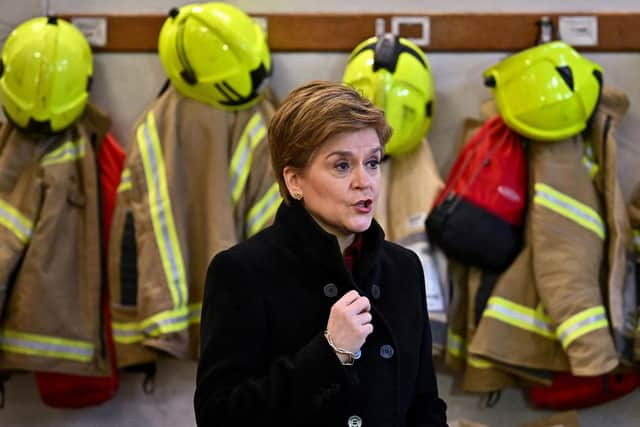Scottish firefighters to be equipped with overdose drug in drive to prevent drug deaths
This article contains affiliate links. We may earn a small commission on items purchased through this article, but that does not affect our editorial judgement.
Scotland recorded a total of 1,339 fatalities in the latest annual statistics, confirmed last year – the highest rate of drug deaths in Europe.
Nicola Sturgeon has been accused of taking her eye off the ball with the issue, with the figures forcing the resignation of drugs minister Joe Fitzpatrick last year, replaced by Angela Constance.
Advertisement
Hide AdAdvertisement
Hide AdThe new trial sees the Scottish Fire and Rescue Service (SFRS) allow volunteers to come forward and become trained and equipped with naloxone, a nasal spray that can reverse the effects of an opioid overdose.


Firefighters across the country will be given training on how best to carry and deploy the drug, as well as given guidance around the signs and symptoms of an overdose.
At a visit to Bathgate Community Fire Station on Wednesday, Ms Sturgeon said it was “reassuring” to know firefighters could now tackle overdoses pro-actively.
She said: “SFRS staff regularly interact with the public during operational incidents, prevention and protection work and community engagement and it is reassuring to know that if they come across a situation involving an opioid overdose that volunteers will be able to administer naloxone while they wait for an ambulance to arrive.


“Naloxone is one of a wide range of measures being used to address the public health emergency of drugs deaths, but it plays an important role and allows those administering the kits to connect people who use drugs and their families with appropriate local services.
“Of course, we want to help people long before they get to the point of a life-threatening overdose and we are working hard to increase the number of people in treatment backed by total funding of £250 million over five years.”
Assistant chief officer Stuart Stevens, the SFRS director of service delivery, welcomed the £90,000 funding from the Scottish Government to help launch the trial.
He said: “We will fully support volunteers within SFRS to complete training to safely administer naloxone to help prevent avoidable drug deaths from overdoses.
Advertisement
Hide AdAdvertisement
Hide Ad"This project highlights our commitment to working with partners to improve the safety and wellbeing of the people of Scotland.”
However, drug deaths campaigner Peter Krykant told The Scotsman while the widespread use and availability of naloxone was welcome, the Scottish Government needed to do more.
He criticised the Scottish model of pushing people towards formal medical treatments, rather than giving charities and other third-sector organisations the ability to deliver key addiction care directly, as well as allowing more heroin-assisted treatment for drug users.
Mr Krykant said: “We do need more than naloxone. We can’t rely on naloxone to solve our drug deaths crisis, it is not going to do that.
“It is going to keep people alive and it is going to save people’s lives, but so much more needs to be done.
"We need to be reducing drug deaths by well over 10 per cent on an annual basis over the next five years. Within the term of this Parliament if drug deaths have not decreased by at least 50 per cent, for me that is not something they can see is progress.”
Want to hear more from The Scotsman's politics team? Check out the latest episode of our political podcast, The Steamie.
It's available wherever you get your podcasts, including Apple Podcasts and Spotify.
A message from the Editor:
Thank you for reading this article. We're more reliant on your support than ever as the shift in consumer habits brought about by coronavirus impacts our advertisers.
If you haven't already, please consider supporting our trusted, fact-checked journalism by taking out a digital subscription.
Comments
Want to join the conversation? Please or to comment on this article.

